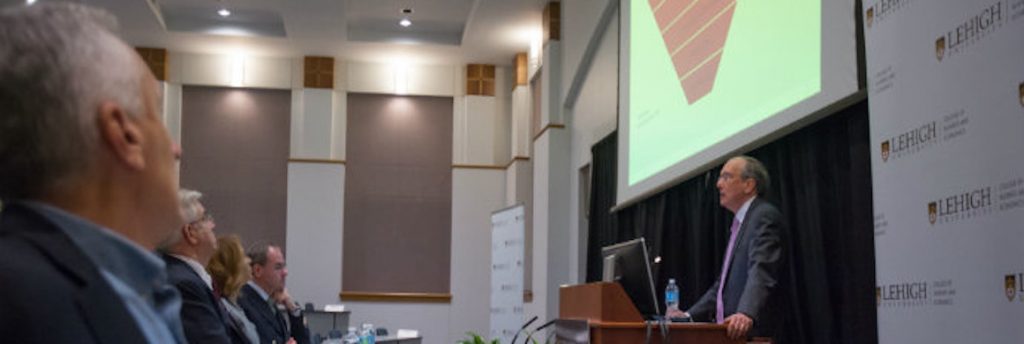Lehigh Symposium Unpacks How to Get Rich or Die Trying

Lehigh’s College of Business and Economics recently hosted its third annual symposium dedicated to examining the complex issue of how people get paid, according to a recent article on the business school’s website. Entitled “Getting Paid: Earnings Issues in Today’s Economy,” the event drew together a collection of educators, community leaders and economists to address a number of topics related to how we all make money.
The Federal Reserve’s William Wascher, a deputy director in the Division of Research and Statistics at the Board of Governors, unpacked the sticky politics surrounding a proposed $15/hour minimum wage as part of the morning lecture crew. Despite the belief by many that such an increase would help families that are less well-off, “there’s a preponderance of evidence that a hike would cost jobs, especially for the lowest skilled workers,” he argued.
Statistically, the workers earning minimum wage tend to be “suburban teenagers from middle- and high-income households,” Wascher said, rather than the people Americans think they are trying to help. Instead, Wascher pointed to research suggesting that a more effective means of reducing poverty and encouraging work would be an earned income tax credit for low- to moderate-income working people.
University of Minnesota AFL-CIO Chair and Public Affairs Professor Morris Kleiner discussed the effect of states’ occupational licensing, which he describes as a “stealth form of regulation.” In fact, occupational licensing is a double-edged sword, he argued. On one hand, it raises the earnings of licensed professionals 10 to 18 percent and “helps shield the public from the incompetent,” but the regulations also make it difficult to work across states and potentially limit innovation. Kleiner proposed benefit-cost analyses, evaluations of existing requirements and “less limiting policies as a substitute for licensing” as paths toward more effective alternatives.
Lehigh Associate Professor of Sociology Danielle Lindemann moderated a panel discussion on gender wage inequality. Panelists included Bryce Covert, economic policy editor for ThinkProgress; NYU Silver Professor of Sociology Paula England; and Laurel Smith-Doerr, an organizational theorist, director of the Institute for Social Science Research and sociology professor at the University of Massachusetts.
“The gender pay gap is real and enduring, with working women earning about 80 cents for every dollar paid to men,” the panelists contended. This is due in large part to discriminatory and biased hiring practices. England cited research she has conducted that found that when an occupation becomes more feminized, the relative pay of that occupation decreases.
Banning “salary secrecy” so employees can talk openly about what they earn, paid family leave and child care initiatives, and pay equity for men and women who do similar work—such as housekeepers and janitors—are all means of bridging this gap, the panelists noted. “We have to think about this not just in terms of individual decisions but at the organizational level,” Smith-Doerr said.
